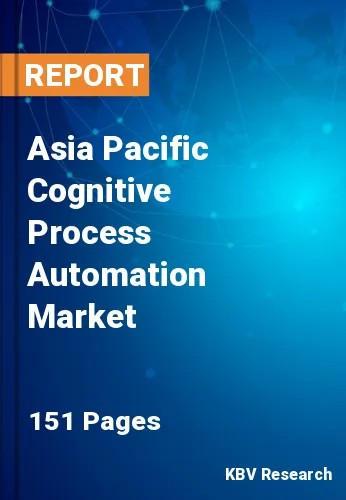The Asia Pacific Cognitive Process Automation Market would witness market growth of 25.5% CAGR during the forecast period (2023-2030).
Cognitive automation is most commonly associated with features in a commercial software system or service tailored to a particular use case. Higher levels of engineering expertise are required for more sophisticated automated cognitive processes. These use cases are typically managed by a specialized team or center of excellence for automation that is knowledgeable about best practices for developing automated systems.
In addition to improving extraction and production efficiency, automation enables corporations to access new deposits. Higher cognitive, social, emotional, and technical skills are anticipated to rise, whereas physical dexterity and basic cognitive abilities are predicted to deteriorate.
Intelligent process automation includes RPA, but it goes much further. To aid all of the employees in the organization and RPA bots, IPA also includes digital process automation (DPA) and Artificial Intelligence (AI) analysis. In essence, IPA adds the data layer. RPA, on the other hand, automates some tasks and procedures, whereas DPA serves as an orchestrator, automating the flow of information between people and bots throughout the business. It connects the company's employees, apps, devices, and other informational databases under a secure platform.
India continues to develop and strengthen its position in the factory automation and industrial control systems, propelled by Industry 4.0. The national economy has benefited from the market under study's adoption of smart technologies. As cost reduction with quality maximization looms larger and larger as an operational paradigm for Indian manufacturers, increased global industrial integration is increasing the push for automation investment. Concern regarding using Industrial Control Systems is growing as cyberattacks on India's smart factories rise. The government has strategies to stop the escalation of these crimes. All the aspects collectively are estimated to support the market growth.
The China market dominated the Asia Pacific Cognitive Process Automation Market by Country in 2022, and would continue to be a dominant market till 2030; thereby, achieving a market value of $2.1 billion by 2030. The Japan market is anticipated to grow at a CAGR of 24.7% during (2023 - 2030). Additionally, The India market would showcase a CAGR of 26.3% during (2023 - 2030).
Based on Application, the market is segmented into Machine Learning, Pattern Identification, Biometrics, Natural Language Processing, and Optical Character Recognition & Others. Based on Vertical, the market is segmented into BFSI, Manufacturing, IT & Telecommunication, Retail & E-commerce, Transportation & Logistics, Media & Entertainment, Healthcare & Life Sciences, Energy & Utilities, and Others. Based on Services, the market is segmented into Finance, Procurement, HR, and IT Operations. Based on Type, the market is segmented into Intelligent Process Automation, and Robotic Process Automation. Based on countries, the market is segmented into China, Japan, India, South Korea, Singapore, Malaysia, and Rest of Asia Pacific.
Free Valuable Insights: The Worldwide Cognitive Process Automation Market is Projected to reach USD 26.9 Billion by 2030, at a CAGR of 24.9%
The market research report covers the analysis of key stake holders of the market. Key companies profiled in the report include Altair Engineering, Inc. (IMG COMPANIES, LLC.), Alteryx, Inc., Hitachi Vantara LLC (Hitachi Ltd.), IBM Corporation, Oracle Corporation, SAS Institute, Inc., TIBCO (The Information Bus Company) Software. Inc., Teradata Corporation, Datameer, Inc., DataRobot, Inc.
By Application
By Vertical
By Services
By Type
By Country
Our team of dedicated experts can provide you with attractive expansion opportunities for your business.

